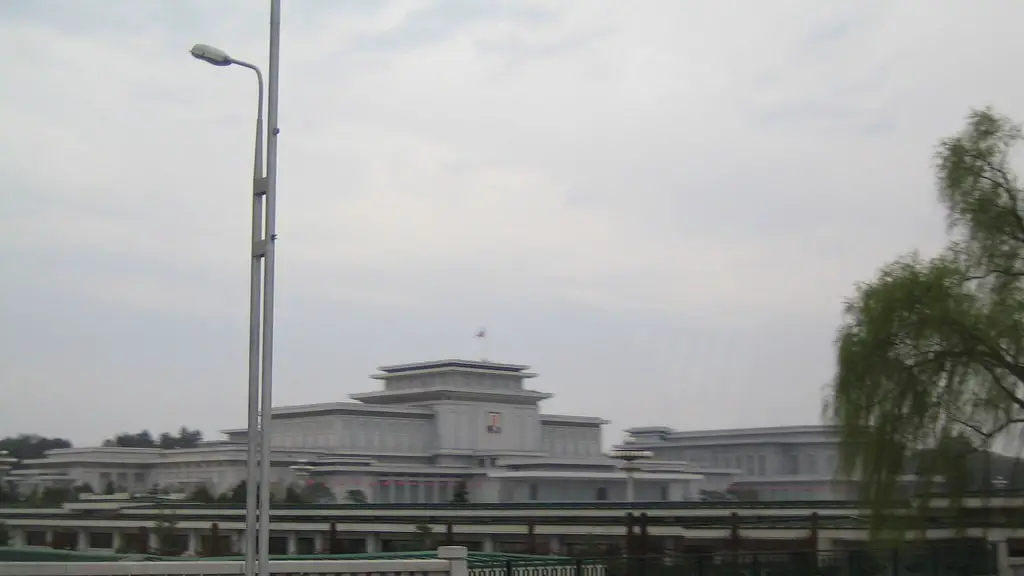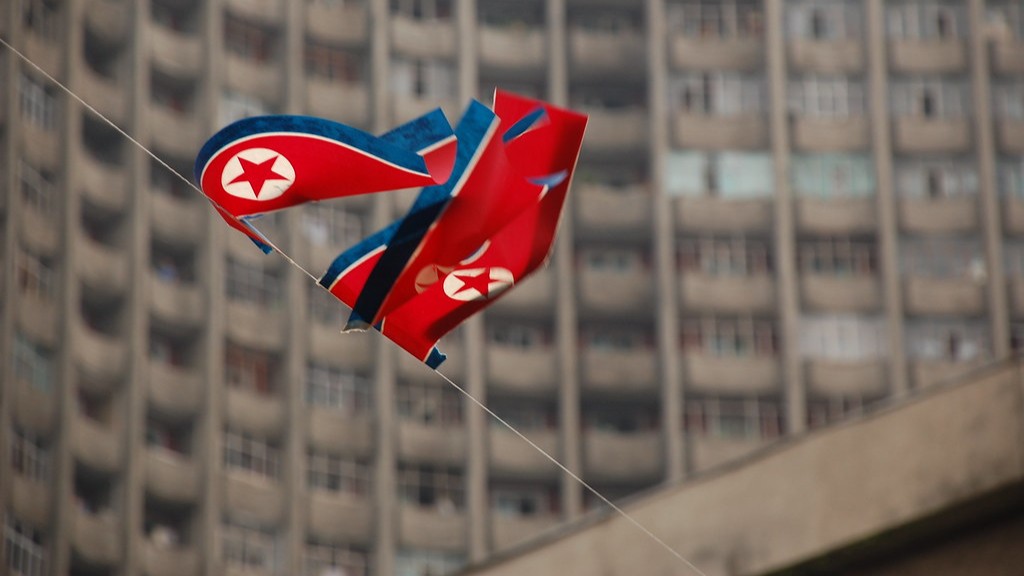North Korea, also known as the Democratic People’s Republic of Korea (DPRK), is notorious for its isolation and cold relationship with the rest of the world. While other countries have opened their doors to globalisation, North Korea remains relatively unaffected and barely linked to the rest of the world. This article will explore why North Korea is so differently viewed by other nations and why it is so disconnected to globalisation.
For almost three decades, North Korea has been ruled by a totalitarian one-party regime that has kept the country closed off from the rest of the world. Under the rule of the Kim family, North Korea has managed to avoid most of the effects of international trade, foreign investment and global technology. Lack of sufficient communication systems have made it impossible to obtain the necessary information to engage in international trade. This lack of openness to globalisation has kept the North Koreans in a state of poverty, with a low GDP per capita, lack of resources and a lack of basic healthcare and educational facilities.
The most obvious factor leading to North Korea’s disengagement from globalisation is the government’s policy of Juche, or self-reliance. This is the belief that the nation and its people should remain independent and economically self-sufficient and rely only on their own resources and capabilities. This policy was implemented in the mid-1970s and is an integral part of North Korea’s ideology, which has prevented it from joining the global economy. Juche is a heavily defended policy, reflected in North Korea’s foreign policy which is largely focused on defending the nation’s status quo at all costs.
In addition to Juche, North Korea has been subject to various international sanctions, in order to discourage its nuclear weapons development and human rights abuses. These sanctions have imposed heavy economic losses on the country and pushed it further away from the rest of the world. As a result, North Korea has relied heavily on China and Russia for trade and diplomatic support. It is estimated that up to 90% of North Korea’s total trade is made with these two countries.
There are other factors which have also limited North Korea’s access to globalisation. Foreign investment has been largely blocked by the government, while telecommunications and internet use are heavily restricted and strictly monitored by the regime. This has made it difficult for people within North Korea to get reliable, up-to-date information, and stay in touch with the outside world.
Overall, North Korea’s disengagement from globalisation is the result of a complex combination of factors, including its authoritarian ideology, the lack of basic technology and infrastructure, and the country’s international isolation. These have kept the North Korean people in a state of poverty and have prevented the regime from ever being embedded in the global economy.
Economic Factors
North Korea’s economic structure can be described as a planned economy, wherein the state centrally plans and controls the economy in its entirety. This economic model discourages economic liberalisation and trade, and its state-led nature has led to low economic growth, lack of investment, and an outdated industrial base.
The government heavily regulates the growth of the market economy, with strict restrictions on the activities of private companies, foreign investors, and individual businesses. These regulations have made it almost impossible for the private sector to thrive, and there are few opportunities for economic cooperation with other nations. This lack of economic opportunity has led to anemic economic growth and a lack of economic engagement with the global economy.
Furthermore, North Korea is also heavily reliant on foreign aid, which is provided mostly through China, Russia, and South Korea. This aid is limited and is often used for military purposes. This lack of access to more substantial aid has reduced the level of international engagement, making it difficult for North Korea to engage in globalisation.
Political Factors
North Korea is an authoritarian, totalitarian state with a one-party system. This system has been in place for decades and has been bolstered by the ‘military-first’ policy of the Kim family, as well as a brutal system of repression, which has led to severe human rights abuses. As a result, North Korea is viewed internationally as a pariah state and has been heavily sanctioned because of its repeated violations of human rights.
The government is also highly suspicious of foreign influence and has a strong sense of nationalism and self-determination, which is reflected in its aggressive foreign policy. This has caused diplomatic tensions with South Korea, Japan, the United States, and various other nations, leading to further international isolation. In addition, North Korea is also legally unable to join any economic union as it has not become a member of the United Nations. This is also due to its strained relations with the international community.
Overall, North Korea’s political environment has made it impossible for the state to open itself up to the global economy. The current regime is unwilling to give up its authoritarian control and is wary of any potential foreign interference. This has led to a highly insular state with few external contacts and relationships.
Social Factors
North Korea is a highly militarised society, and its citizens are expected to be loyal to the government and the ruling Kim family. This has led to deep-seated fears and mistrust from the outside world, and North Koreans themselves have been taught to be wary of foreigners. This, combined with the lack of access to information and communication systems, means that North Koreans are largely unaware of the rest of the world.
North Koreans are also heavily monitored and controlled by the state, and their access to both foreign and domestic media is heavily restricted. This has prevented them from being exposed to different ideas, points of view and perspectives which could help them better understand the importance of globalisation.
The lack of access to basic technologies such as the internet, mobile phones and reliable communication systems has also played a role in preventing North Koreans from engaging with the rest of the world. This has been made more difficult by the lack of electricity and running water in some areas of the country.
Cultural Factors
North Korea is renowned for its heavily nationalist culture. The Kim family have used their power to promote nationalistic rituals and symbols, which have been used to bolster their rule and supress any form of criticism or dissent. Moreover, North Korea has a long tradition of Confucianism and feudalism, which is reflected in the government’s strict, authoritarian nature.
This strong sense of national identity has also made it difficult for North Koreans to accept other cultures and points of view. As a result, most North Koreans are almost entirely unaware of the outside world and globalisation as a concept, and this has increased the government’s control over its population.
International Reactions
North Korea’s disengagement from globalisation has been largely viewed with alarm by the international community. Since the early 2000s, North Korea has been subject to heavy international sanctions for its nuclear weapons program and its human rights abuses. These sanctions have had a severe impact on North Korea’s already limited access to globalisation, and in 2016, the United Nations declared that the government’s sanctions had led to increased levels of poverty and deprivation.
The international community has also taken steps to try and persuade North Korea to open its doors to globalisation. In 2018, the United Nations introduced the ‘North Korea Globalisation Initiative’, which seeks to persuade North Korea to slowly open up its markets and allow small foreign investment. This initiative has been met with a positive response from the government, and there are signs of slow economic liberalisation occurring within the nation.
Taking Positive Steps
Despite the many obstacles to globalisation, North Korea is slowly making efforts to embrace globalised norms. Since the introduction of the Globalisation Initiative, North Korea has taken steps to liberalise its economy and improve its trading relationships with other nations.
One of the most notable examples of progress has been the reopening of the Kaesong Industrial Complex in 2018. The complex was established in 2004 as a joint venture between North and South Korea and was the first large-scale example of North Korea engaging in globalisation. The complex was closed in 2016 due to political tensions, but in 2018, it was reopened with improved trade regulations and more stringent worker protection laws.
North Korea has also plans to expand its Special Economic Zones, which are areas that offer foreign investors tax incentives and other advantages. This is seen as a positive sign of North Korea slowly embracing globalisation and engaging in international trade.
Conclusion
North Korea’s disengagement from globalisation is the result of a complex combination of historical, economic, political, social and cultural factors. The state’s authoritarian regime, lack of access to technology, and international sanctions have kept the North Korean people in a state of poverty and have prevented them from ever being embedded in the global economy.
Despite these obstacles, North Korea is slowly making positive steps towards opening itself up to globalisation. The reopening of the Kaesong Industrial Complex and the expansion of special economic zones are two examples of how North Korea is starting to engage with the outside world. These are hopeful signs, but there is still a long way to go before North Korea can fully join the global economy.

